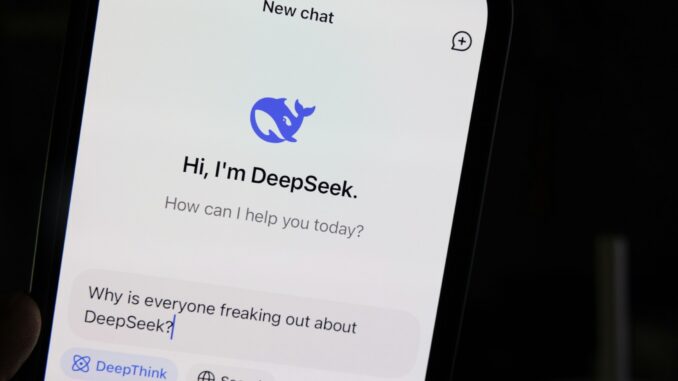
Legislators in the US are advocating for a prohibition on DeepSeek following security experts discovering that the application is sending user information to a prohibited state-affiliated enterprise.
DeepSeek, virtually unheard of mere weeks ago, swiftly captured the attention of the tech community—earning international recognition for its innovative capabilities while igniting discussions reminiscent of the TikTok controversy.
Its ascent has been propelled in part by its business framework: in contrast to many of its American rivals, such as OpenAI and Google, DeepSeek provided its sophisticated functionalities for no cost.
Nevertheless, apprehensions have surfaced regarding DeepSeek’s broad data harvest methods, prompting Microsoft and OpenAI to initiate an investigation into a potential intrusion of the latter’s systems by a group reportedly affiliated with the Chinese AI company.
A challenge to US AI supremacy
DeepSeek’s remarkable abilities have suddenly established it as a significant rival to American AI giants like OpenAI’s ChatGPT and Google Gemini. Yet, along with the application’s exceptional capabilities, worries have arisen regarding alleged connections to the Chinese Communist Party (CCP).
As reported by cybersecurity analysts, concealed programming within DeepSeek’s AI has been discovered sending user data to China Mobile—a state-owned telecommunications provider banned in the US. DeepSeek’s own privacy policy allows for the gathering of information such as IP addresses, device specifications, and, most troubling, even keystroke patterns.
These revelations have catalyzed bipartisan initiatives in the US Congress to limit DeepSeek’s reach, with legislators rushing to safeguard sensitive information from potential CCP intervention.
Representatives Darin LaHood (R-IL) and Josh Gottheimer (D-NJ) are leading efforts to propose legislation that would ban DeepSeek’s installation on all government-issued devices.
Several federal departments, including NASA and the US Navy, have already preemptively barred DeepSeek. Likewise, Texas has imposed its own restrictions.
The potential prohibition of DeepSeek: a TikTok repeat?
The disputes surrounding DeepSeek echo discussions about TikTok, the social media application owned by Chinese firm ByteDance. TikTok continues to face scrutiny over claims that user data may be accessible to the CCP, however, concrete evidence has yet to emerge.
In contrast, the situation with DeepSeek comes with undeniable proof, as unveiled by cybersecurity detectives who uncovered the application’s unauthorized data transmissions. While some may argue that DeepSeek mirrors the TikTok controversy, security specialists contend that it signifies a much clearer and well-documented risk.
Legislators globally are paying attention. Beyond the initiatives in the US, DeepSeek has already encountered bans from governmental systems in nations such as Australia, South Korea, and Italy.
AI becomes a geopolitical battleground
The worries linked to DeepSeek underscore how AI has evolved into a geopolitical flashpoint among global powers—particularly between the US and China.
American AI firms such as OpenAI have enjoyed a leading status in recent years, yet Chinese companies have invested heavily in narrowing the gap and, in certain instances, surpassing their US rivals.
DeepSeek’s rapid expansion has disrupted that equilibrium, not just due to its AI models but also because of its pricing approach, which undercuts competitors by providing the application at no cost. This raises the question of whether it is genuinely “free” or if the price is paid in diminished privacy and safety.
The involvement of China Mobile further raises concerns, considering the state-owned telecom company’s previous sanctions and prohibition from the US market. Critics fear that data acquired through platforms like DeepSeek might enhance Chinese surveillance efforts or even facilitate potential economic manipulations.
A national DeepSeek ban is conceivable
If the proposed legislation in the US is enacted, it could signify the initial move toward nationwide limitations or a complete ban on DeepSeek. Geopolitical friction between China and the West continues to influence policies surrounding advanced technologies, and AI seems to be the latest battlefield in this ongoing strategic contest.
For the time being, the demands for the regulation of applications like DeepSeek are likely to intensify. Discussions regarding data privacy, national security, and ethical considerations in AI innovation are becoming increasingly urgent as individuals and organizations worldwide navigate the opportunities and hazards presented by next-generation technologies.
DeepSeek’s ascension may have indeed unsettled the AI hierarchy, but whether it can sustain its momentum amidst escalating global resistance remains to be determined.
(Photo by Solen Feyissa)
See also: AVAXAI brings DeepSeek to Web3 with decentralized AI agents
Want to discover more about AI and big data from industry leaders? Check out the AI & Big Data Expo happening in Amsterdam, California, and London. The extensive event is co-located with other prominent events such as the Intelligent Automation Conference, BlockX, Digital Transformation Week, and Cyber Security & Cloud Expo.
Explore other forthcoming enterprise technology events and webinars powered by TechForge here.








Brilliant discourse! Trump Coin embodies the intersection of crypto and politics.